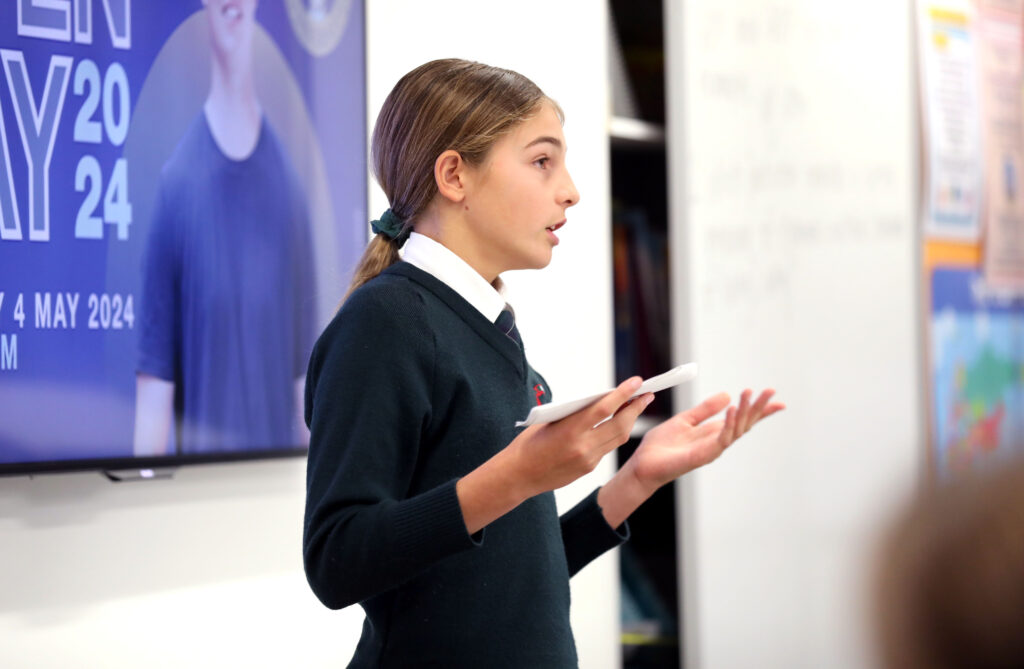The Value of Student Voice – Jennifer Oaten

‘Nothing about me without me’ is a phrase that says a lot about the importance of student voice.
Education is about educating young minds, but if young people do not have a say in their education, we are missing a valuable opportunity to hear from those most impacted by our decisions.
As a principal, one of the most rewarding aspects of my role is enabling our students to have a voice and spending time listening to their thoughts, ideas, and opinions.
Recently, a quote on student voice by Gretchen Brion-Meisels from the Harvard Graduate School of Education resonated deeply with me: “Student voice means recognizing that young people have a perspective on the world that adults can’t share and that their perspective should be welcomed alongside the wisdom that adult perspectives bring.”
Student voice is an approach in which students are encouraged to share their values and perspectives with those in educational leadership positions. Those leaders actively listen and make decisions based on these shared ideas.
Enabling student voice allows our students to share their beliefs and provides them with the opportunity to express their views. Empowering student voice helps our students develop confidence and understand that their voices are valued, even at a young age.
If young people have authentic opportunities to share their perspectives and participate in decision-making regarding what affects them in their school community and in the classroom, they become invested stakeholders.
‘Speaking up’ is a crucial life skill that enables today’s youth to make a positive impact on their own lives and those of others. However, to do so, they need platforms to express themselves and the courage to speak out.
What are the benefits of student voice?

Incorporating student voice has many benefits for students, staff and school environments.
1. Improved School Climate: Encouraging student voice contributes to a positive school climate where students feel respected, supported, and valued. This can lead to better relationships between students and staff, creating a more collaborative and inclusive learning environment. If students believe that they are valued for their perspectives, they begin to develop a sense of ownership and attachment to the community in which they are involved. Student voice also encourages students to speak up about poor behaviour.
2. Increased Student Engagement: When students feel that their opinions and ideas are heard and valued, they are more likely to be actively engaged in their learning and in their school community. Giving students a platform to express their thoughts and concerns fosters a sense of ownership and responsibility. Student voice can encourage collaboration, provide motivation for improvement and a willingness to positively engage both in and beyond the classroom.
3. Enhanced Learning Outcomes: Student voice promotes critical thinking, problem-solving, and decision-making skills. When students participate in shaping their educational experiences, they develop a deeper understanding of the learning process and are more motivated to achieve their goals. When teachers listen to and incorporate student feedback, they gain valuable insights into their teaching practices. This feedback can help teachers adapt their instruction to better meet the needs and interests of their students and improve learning outcomes.
4. Development of Leadership Skills: Student voice initiatives provide opportunities for students to take on leadership roles and develop essential skills such as communication, teamwork, and advocacy. These skills are valuable not only in school but also in their future careers and personal lives.
5. Promotion of Equity and Inclusion: Student voice practices ensure that diverse perspectives are heard and considered. By amplifying the voices of all students, including those from marginalised or under-represented groups, schools can identify and address issues related to equity and inclusion.
6. Preparing Active Citizens: Our world needs active community members who are informed and willing to share their viewpoints. Student voice activities help students develop the skills and confidence necessary to become engaged citizens. They learn to advocate for themselves and others and participate in decision-making processes, which contribute to growing their communities.

How can students' voices be heard?
There are many ways that educators can create opportunities for student voice:
Gather regular student feedback through surveys or feedback forms on decisions, issues or concerns.
- Create targeted groups, such as our Academic Committee, who provided feedback on the use of AI in the classroom and other teaching and learning decisions, including new subject offerings.
- Provide opportunities for leaders’ voices to be heard, such as our conversation and afternoon tea with the Principal for each year groups or regular Dean meetings with leaders.
- Involve students in the development of your strategic plan. For example, Our ‘Create the Change’ process provided our students with the opportunity to submit big ideas for consideration in our Strategic Plan.
- Involve students in decision-making processes related to policies or the development of strategies. A successful example of this is when we conducted workshops and activities to collect data from students for the development of our Mental Health Strategy.
- Provide opportunities to develop confidence to speak out through public speaking, debating, and understanding communication skills and effective ways of sharing perspectives.
- Provide platforms for student leadership, such as student councils, to submit proposals to improve school life, organise events or generate new ideas.
- Obtain feedback from students on learning opportunities as this could lead to ongoing classroom improvement regarding assessments, resources or strategies.
- Provide a student-led suggestion box in a high-traffic area. Provide a form for students to complete with suggestions, which student leaders can then review.
- Call for volunteers for working parties that focus on short-term tasks that may be a passion for students.
Teaching students how to effectively express themselves is important, as we cannot assume they already know how to do so.

How can parents encourage student voice at home?
While student voice is primarily fostered within the school environment, parents can also play an important role in elevating their children’s voices. Here are some tips for how parents can support student voice at home:
1. Make space for open dialogue: Set aside time each day for your child to share their thoughts, questions, and concerns. Listen attentively and avoid the urge to immediately problem-solve or to step in with your opinions.
2. Empower decision-making: Provide your child with opportunities to make choices, whether it is about their schedule, co-curricular activities, or responsibilities at home and their reasons why or why not.
3. Validate their perspectives: Let your child know that their opinions and ideas are valued, even if they differ from your own. Acknowledge their viewpoints and avoid dismissing them.
4. Encourage self-advocacy: Teach your child strategies for expressing their needs and preferences for themselves in a respectful, constructive manner. Role-play how to have respectful discussions with teachers when they need something different or they do not understand.
5. Model active citizenship: Demonstrate how you use your own voice to participate in community affairs. Invite your child to brainstorm ways you can get involved together or how they can have a voice that assists others to speak up or ensures those on the fringes can also be heard.
By nurturing student voice at home, parents empower their children to become confident, engaged, and self-directed learners. This, in turn, supports the work schools are doing to elevate student voice.
Empowering student voice is not just about giving students a say—it is about recognising them as key stakeholders in their education. By creating opportunities for students to influence their learning environment, we empower them as agents of change and give them the confidence to speak up, both in school and beyond
Prioritising student voice is an essential component of creating equitable, engaging, and effective learning communities and experiences so that all students thrive.

The Value of Student Voice – Jennifer Oaten
“At Santa Maria College, we are not only given the opportunity, but we are encouraged by our teachers and each other to voice our opinions, concerns and ideas—to continue moving forward as a school and as a community. Student voice is integral for growth, and allows for us, as students to have an active role in shaping our education.”

Shining a Spotlight on Our Student Ministry Team
This week, we shine a light on a dynamic group of students – our Ministry team, who are doing wonderful things in the Faith space.

Weekly Wrap Up: Term 2, Week 3, 2024
This Weekly Wrap Up is brimming with activity including the Freeze Frame Opera, the Sisterhood Series and Year 9 French.
- Featured
Author: Santa Maria College
Santa Maria College is a vibrant girls school with a growing local presence and reputation. Our Mission is to educate young Mercy women who act with courage and compassion to enrich our world. Santa Maria College is located in Attadale in Western Australia, 16 km from the Perth CBD. We offer a Catholic education for girls in Years 5 – 12 and have 1300 students, including 152 boarders.







